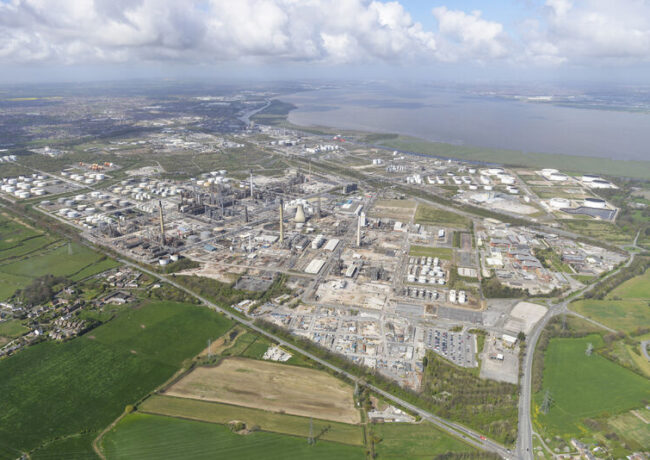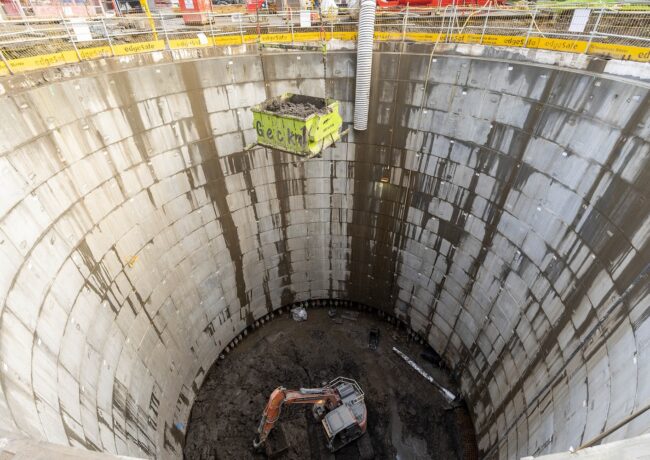Regional thumbs-up for homegrown power push
The government’s energy security strategy has doubled the target for hydrogen production, and given hope for nuclear ambitions at Anglesey’s Wylfa site.
With energy security and pricing at the top of the news agenda, the government has today published the Britain’s Energy Security Strategy document, with the headline target being that 95% of electricity produced by 2030 could be low-carbon.
Wind, solar and hydrogen are to be promoted, however in the short term at least domestic oil and gas are to be prioritised. The target for hydrogen production has been doubled to 10GW by 2030.
The strategy will see a “significant acceleration of nuclear” with an ambition of up to 24GW by 2050, which would meet around 25% of the UK’s energy demand.
The government said that subject to industry readiness, Small Modular Reactors would form a key part of the pipeline.
Wylfa is among the sites in the frame, reiginting hopes for the site that seemed dashed when Hitachi susidiary Horizon pulled its plans for a £20bn nuclear power plant in February 2021.
A £120m enabling fund will be set up this month under the stewardship of a new body, Great British Nuclear.
A new licensing round for North Sea oil and gas will be held this autumn, while in wind, there is a desire for more building in deeper waters further offshore. On-shore does not look a priority, with the government saying “we will be consulting on developing partnerships with a limited number of supportive communities”.
There will also be a £30m competition this year as the government seeks to establish domestic manufacturing capacity in heat pumps.
With a plannning inspectorate decision expected soon on the £165m plans for a coal mine near Whitehaven, no mention was made of coal in the report.
There are major plans around hydrogen in the region, with Essar and Progressive Energy agreeing a joint venture for a £1bn production hub at Stanlow in January, and consultation now complete on a hydrogen pipeline.
Business and energy secretary Kwasi Kwarteng, said: “We need to protect ourselves from price spikes in the future by accelerating our move towards cleaner, cheaper, home-grown energy.
“The simple truth is that the more cheap, clean power we generate within our borders, the less exposed we will be to eye-watering fossil fuel prices set by global markets we can’t control.
“Scaling up cheap renewables and new nuclear, while maximising North Sea production, is the best and only way to ensure our energy independence over the coming years.”
Regional reactions
Professor Joe Howe, chair of the North West Hydrogen Alliance and executive director of the Eenergy Research Institute at the University of Chester, said:
“The decision to rapidly ramp up hydrogen production, which will simultaneously cut carbon emissions and boost energy security, is one we strongly welcome. Accelerating delivery and use of low carbon hydrogen is essential, alongside electrification, to reach net zero. We would argue that the target could go a step further with 15GW possible by 2030.
“With HyNet, the North West of England is perfectly placed to make a significant contribution to this new national energy system. Set to be operational by 2025, it’ll produce around 4GW of continuous peak output of hydrogen – 40% of the Government’s new national target by 2030. Coupled with carbon capture and storage, it’ll provide a low carbon, sustainable future use for natural gas in the coming decades.”
Ged Barlow, chief executive of industry cluster Net Zero North West, said that the body’s members are facing a collective energy bill up to £1bn for 2022, a 65% increase on 2020.
He added: “The current challenges only serve to highlight why we need an integrated and resilient net zero energy strategy in the UK, which will help to protect us against pressures such as increasing energy prices while enabling the transition to net zero.
“Today’s strategy recognises the role that natural gas will continue to play and that producing it in the UK has a lower carbon footprint than imported from abroad. It is an important transition fuel and shouldn’t be demonised. Reaching net zero is a journey and we will require carbon capture and blue hydrogen to get us there.
“This does not mean a step back from net zero. In fact, we suggest that the additional tax income from more UK produced natural gas could be used to fund the transition to net zero.”
Myles Kitcher, executive director of Peel NRE, said that clustering is the key but that on-shore wind and solar deserve a greater role: “At Protos we’ve developed a blueprint for clustering together different low carbon energy technologies and creating a circular economy. This includes plans for a local CO2 network with carbon capture and storage inevitably going to be a critical part of our transition to net zero.
“Reaching the Government’s ambition for 95% of electricity being low carbon by 2030 is going to require a huge roll out of renewables. We would have liked to see a firmer commitment to the role that onshore wind can play and a removal of the current moratorium as well as recognising the huge potential of solar farms.
“These are the projects that will deliver in the short term, before new nuclear and offshore wind come online.”
The NWHA’s Howe concluded that “Government policy, regulation and funding most go hand-in-hand with the new target.”





We should not forget the huge reserves of shale gas underneath the Mersey and much of West Lancashire. Easily extractable via proven, safe technology within a world-leading regulatory environment. It was only politics (May’s slim majority) that stopped us from benefitting from the jobs, taxes and energy security right beneath our feet.
Far better to source it ourselves than give billions a year away to Russia and Qatar at a far higher environmental cost, when distribution is taken into account.
By Sceptical
Only politics? I’ve heard of “political earthquakes” but they are only metaphorical. The earthquakes that called a halt to fracking were very real.
Perhaps if the earthquakes were under Manchester rather than off the coast of Blackpool or Liverpool certain people might feel differently about fracking.
By Jeff
There is a lot of Shale under Sussex. They are not digging there. Lancashire’s whole history is built on being dug up and disfigured so this country can prosper. Let someone else have the scars for once.
By Elephant